“Alas! His golden lips have been silenced!”
Too often have we Orthodox Christians grown used to “taking for granted” the great men in our midst, of not valuing them as we ought until they have departed from us—and even then not evaluating them properly, and letting their significance and their teaching slip away from us into oblivion.
Archbishop Averky was one of the last giants of 20th-century Orthodoxy, not merely of the Russian Church Outside of Russia, or even of Russian Orthodoxy—but of the whole of the 20th-century Orthodox Church.

Born Alexander Pavlovich Taushev on October 19 (Nov. 1) 1906, in Kazan, Archbishop Averky was of a noble family. His father was a government official whose duties took him to many parts of Russia, allowing young Alexander to have a first-hand acquaintance with the heart of Holy Russia, its monasteries and holy places; the memory of these places remained with him all his life, even though he left his homeland while still a young teenager. Even at that tender age he was attracted to books of a spiritual nature, such as Unseen Warfare, and already from the age of seven or eight he began to feel an alienation from the ordinary life of the world and a subconscious attraction towards the monastic life.
In the midst of the civil war that followed on the Revolution of 1917, the Taushev family left Russia, in 1920, with great grief of soul. The family settled in the Bulgarian city of Varna, where Alexander attended school until 1926. The chief religious influence for him at this time was the local parish church and its priest, Father John Slunin.
Then, in 1925, a bishop came to Varna who was to give Alexander’s life its direction: Archbishop Theophan of Poltava, a strict monk, a man of prayer, and theologian in the true Patristic tradition. After meeting him, the young student resolved to undertake the monastic way of life. With Archbishop Theophan’s blessing, he attended the Theological Faculty of the University of Sophia, and on graduating from it with brilliant success in 1930 he went to Carpatho-Russia (in Czechoslovakia) with the intention of becoming a monk and serving the Russian Church. Tonsured a monk there in 1931, and ordained priestmonk the next year, he served several parishes and assisted the abbot of the monastery of St. Nicholas near the village of Iza. Soon he also undertook responsibilities as editor of the diocesan periodical and teacher of catechism in secondary schools.
When Carpatho-Russia was occupied by the Magyars in 1940, Father Averky went to Belgrade and served under Metropolitan Anastassy, Chief Hierarch of the Russian Church Abroad, conducting courses in religious subjects both for seminarians and laymen.
When the Synod of Bishops moved to Munich in 1945, he followed it and continued his work of the religious education of youth. In 1950 he was appointed by the Synod as chairman of its Missionary Education Committee. When he came to America in 1951 he was invited to the newly-organized Holy Trinity Seminary at Jordanville, New York, to teach New Testament, Liturgics, and Homiletics. In 1952 he became Rector of the Seminary, in 1953 Bishop of Syracuse, and in 1960, at the death of Archbishop Vitaly, Abbot of Holy Trinity Monastery. In these positions he continued until his death his life’s work of enlightening the Orthodox faithful, both the future pastors of the seminary (about 100 priests came from the seminary in these years) and all those who read the Monastery’s publications, which were all solid works of Orthodox piety and theology. His sermons appeared frequently in the Monastery’s bimonthly publication,Orthodox Russia, and his own books included textbooks on Homiletics and the interpretation of the New Testament (2 volumes), collections of his sermons and articles, and works on the life and letters of his beloved Abba, Archbishop Theophan.

All of the writings of Archbishop Averky bear one and the same character of love for God’s truth, righteous zeal in expressing it, and urgent exhortation to others to follow it.
The abundance with which his golden lips gushed the sweet honey of the pure teaching of Orthodoxy, especially in his most fruitful last years, has perhaps helped to hide from us the rarity and even uniqueness of his teaching in our evil days. We have grown so used to his flaming and bold words that we have not noticed that he was virtually the only hierarch of any Orthodox church writing in any language with such boldness and uprightness in defense of Orthodoxy.
In earlier centuries the Church had many Holy Fathers writing in defense of Orthodoxy against the numerous heresies which attacked her singly or together. But in our day, when Orthodox Christians are losing the savor of Orthodoxy and virtually all the Local Orthodox Churches are giving in to the apostasy of our times, his voice was almost the only one to continue speaking the truth with such vigor and boldness, even amid the many infirmities of his old age. Truly, he was a champion of Orthodoxy in our age when faith is growing cold.
His view of the contemporary world was sober, precise, and entirely inspired by the Sacred Scripture and Holy Fathers of the Church: He taught that we live in the age of the Apostasy, the falling away from true Christianity, when the “mystery of iniquity” has entered its final stage of preparation for the “man of sin,” Antichrist (II Thes. 2:3-12[1]). Archbishop Averky traced the development of this Apostasy in particular from the time of the schism of the Church of Rome (1054 AD), through the era of Humanism, the Renaissance and Reformation, the French Revolution, 19th-century materialism and communism, culminating in the Russian Revolution of 1917, which removed the last great barrier to the working of the mystery of iniquity and the coming of Antichrist. (See his book, True Orthodoxy and the Contemporary World, Jordanville, 1971, pp. 18–21; the quotes that follow are all from this book).
In such an age, he writes, “to be a true Orthodox Christian, ready unto death to preserve one’s faithfulness to Christ the Saviour, in our days is much more difficult than in the first centuries of Christianity” (p. 17). Although often open (in the lands under communist control), the persecution against Christianity today is more often hidden. “Under the covering of a deceptive outward appearance that looks good and leads many into error, in actuality there is occurring everywhere today a hidden persecution against Christianity… This persecution is much more dangerous and frightful than the previous open persecution, for it threatens a complete devastation of souls—spiritual death” (18). He often quoted the words of St. Theophan the Recluse about the latter times: “Although the name of Christian will be heard everywhere, and everywhere there will be churches and church services, all this will be only an appearance, while within there will be a true apostasy” (21).
In fulfillment of these words in our own days, Archbishop Averky writes, “The Christian world, it is frightful to say, presents today a frightful, cheerless picture of the most profound religious and moral decadence” (22). The temptation of worldly comfort and prosperity drive God away from the soul. “The servants of antichrist more than anything else strive to force God out of the life of men, so that men, satisfied with their material comfort, might not feel any need to turn to God in prayer, might not remember God, but might live as though He did not exist. Therefore, the whole order of today’s life in the so-called ‘free’ countries, where there is no open bloody persecution against faith, where everyone has the right to believe as he wishes, is an even greater danger for the soul of a Christian (than open persecution), for it chains him entirely to the earth, compelling him to forget about heaven. The whole of contemporary ‘culture,’ directed to purely earthly attainments and the frantic whirlpool of life bound up with it, keeps a man in a constant state of emptiness and distraction which give no opportunity for one to go at least a little deeper into his soul, and so the spiritual life in him gradually dies out” (29). All of contemporary life, on the public level, is a preparation for the coming of Antichrist: “All that is happening today on the highest level of religion, government, and public life … is nothing else than an intense work of preparation by the servants of the coming Antichrist for his future kingdom” (24), and this work is being done as much by “Christians” as by non-Christians (18).
After painting such a grim picture of the present and future, Archbishop Averky calls on Orthodox Christians to struggle against the spirit of this world that lies in evil. “All who in the present day desire to preserve faithfulness to Christ the Saviour must guard themselves especially against every attraction towards earthly goods and against being deceived by them. It is extremely dangerous to give oneself over to every desire to make a career for oneself, to make a name for oneself, to obtain authority and influence in society, to acquire wealth, to surround oneself with luxury and comfort” (28).
To those willing to struggle to preserve their faith, Archbishop Averky offers a sober and inspiring path of confession: “Now is the time of confession—of a firm standing, if need be even to death, for one’s Orthodox faith, which is being subjected everywhere to open and secret attacks, oppression, and persecution on the part of the servants of the coming Antichrist” (28). We must be true Christians, not given in to the spirit of the times, making the Church the center of our lives (26). Giving thanks to God for the existence of our Russian Church Outside of Russia, “which has not tainted itself by submitting to the dark powers of Antichrist that are acting in the contemporary world” (24), we must be “its faithful and devoted children, and at the same time its missionaries, fighters for the true faith of Christ, both in the non-Orthodox environment that surrounds us and among the Russian people who have fallen away or are falling away from it” (27). We must lead a conscious life of prayer, nourished by the reading of Scripture and the Holy Fathers and by frequent confession and reception of Holy Communion (30).
The path ahead of us, despite the deceptive promises of modern “progress,” is a path of suffering: “The Lord has clearly said that it is not ‘progress’ that awaits us, but ever greater tribulations and misfortunes as a result of the increase of lawlessness and the growing cold of love; when He comes, He will scarcely find faith on earth (Luke 18:8)[2].”
The strength of the true Christian in the terrible times ahead is the apocalyptic expectation of the Second Coming of Christ: “The spirit of a constant expectation of the Second Coming of Christ is the original Christian spirit, which cries out in prayer to the Lord: Even so, come, Lord Jesus (Apoc. 22:20)[3]. And the spirit opposed to this is undoubtedly the spirit of Antichrist, which strives by every means to draw Christians away from the thought of the Second Coming of Christ and the recompense which follows on it. Those who give in to this spirit subject themselves to the danger of not recognizing Antichrist when he comes and of falling into his nets. Precisely this is the most frightful thing in the contemporary world, which is filled with every possible deception and temptation. The servants of Antichrist, as the Lord Himself has forewarned us, will try, ‘if possible, to deceive the very elect’ (Matt 24:24)[4]. The thought of this, however, should not oppress or crush us, but on the contrary, as the Lord Himself says, Then look up, and lift up your heads, for your redemption draweth nigh (Luke 21:28)[5].”
It is such a man, a true Holy Father of these latter times, filled with the Christian apocalyptic expectation of Christ’s Second Coming and with the sober Orthodox spirit of preparedness for it, who is the author of a patristic commentary on the culminating book of the New Testament Scriptures, the Apocalypse of St. John the Theologian. Although his interpretation of the book is based solidly on the early Fathers of the Church, the very fact that he himself is so much in their spirit, and in the spirit of St. John, is a pledge for us of the accuracy of his commentary, as well as of the fact that it can speak not merely to our curious minds, but also and above all to our believing hearts. Archbishop Averky was an Orthodox scholar in the unbroken tradition of patristic thought which has come down to us from the ancient Fathers to our own days, and which he imbibed most of all in his own teachers, the 19th-century St. Theophan the Recluse (†1894) and the 20th-century Theophan of Poltava (†1940). An unblemished teacher of the Orthodox moral and spiritual life, he is also an unrivalled theological and patristic guide for us.
There are few saints left in our pitiful times. But even if we do not see about us now such upright and righteous ones as he, his teaching remains with us and can be our guiding beacon in the even darker days ahead which he foresaw, when the Church may have to go into the wilderness, like the Woman of the Apocalypse (ch. 12)[6]—the Church of the last times.
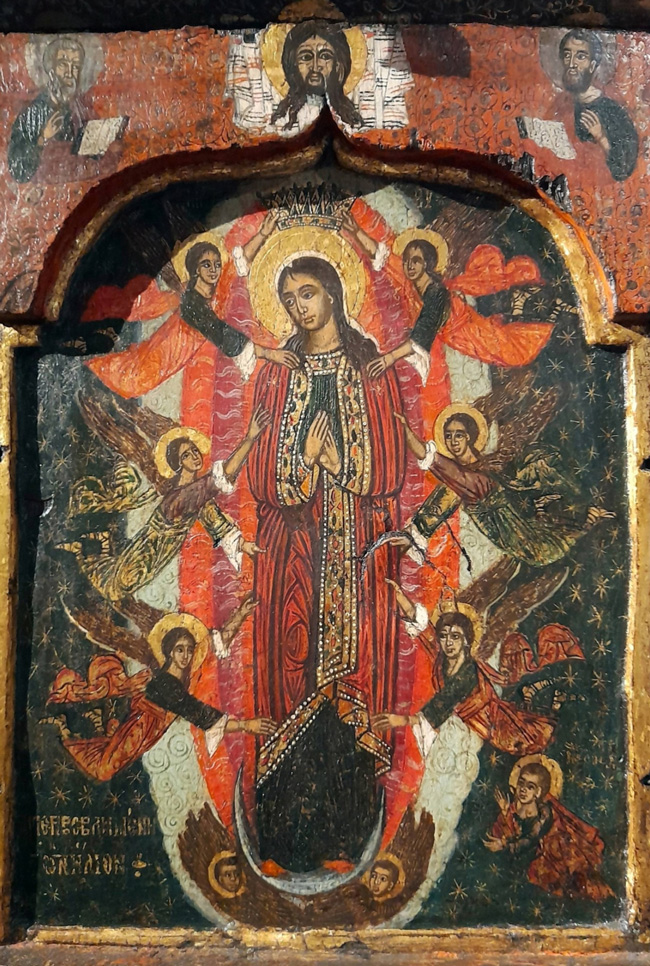
[1] Now we beseech you, brethren, by the coming of our Lord Jesus Christ, and by our gathering together unto him, That ye be not soon shaken in mind, or be troubled, neither by spirit, nor by word, nor by letter as from us, as that the day of Christ is at hand. Let no man deceive you by any means: for that day shall not come, except there come a falling away first, and that man of sin be revealed, the son of perdition; Who opposeth and exalteth himself above all that is called God, or that is worshipped; so that he as God sitteth in the temple of God, shewing himself that he is God. Remember ye not, that, when I was yet with you, I told you these things? And now ye know what withholdeth that he might be revealed in his time. For the mystery of iniquity doth already work: only he who now letteth will let, until he be taken out of the way. And then shall that Wicked be revealed, whom the Lord shall consume with the spirit of his mouth, and shall destroy with the brightness of his coming: Even him, whose coming is after the working of Satan with all power and signs and lying wonders, And with all deceivableness of unrighteousness in them that perish; because they received not the love of the truth, that they might be saved. And for this cause God shall send them strong delusion, that they should believe a lie: That they all might be damned who believed not the truth, but had pleasure in unrighteousness. II Thes. 2:1-12
[2] And he spake a parable unto them to this end, that men ought always to pray, and not to faint; Saying, There was in a city a judge, which feared not God, neither regarded man: And there was a widow in that city; and she came unto him, saying, Avenge me of mine adversary. And he would not for a while: but afterward he said within himself, Though I fear not God, nor regard man; Yet because this widow troubleth me, I will avenge her, lest by her continual coming she weary me. And the Lord said, Hear what the unjust judge saith. And shall not God avenge his own elect, which cry day and night unto him, though he bear long with them? I tell you that he will avenge them speedily. Nevertheless when the Son of man cometh, shall he find faith on the earth? Luke 18:1-8
[3] And, behold, I come quickly; and my reward is with me, to give every man according as his work shall be. I am Alpha and Omega, the beginning and the end, the first and the last. Blessed are they that do his commandments, that they may have right to the tree of life, and may enter in through the gates into the city. For without are dogs, and sorcerers, and whoremongers, and murderers, and idolaters, and whosoever loveth and maketh a lie. I Jesus have sent mine angel to testify unto you these things in the churches. I am the root and the offspring of David, and the bright and morning star. And the Spirit and the bride say, Come. And let him that heareth say, Come. And let him that is athirst come. And whosoever will, let him take the water of life freely. For I testify unto every man that heareth the words of the prophecy of this book, If any man shall add unto these things, God shall add unto him the plagues that are written in this book: And if any man shall take away from the words of the book of this prophecy, God shall take away his part out of the book of life, and out of the holy city, and from the things which are written in this book. He which testifieth these things saith, Surely I come quickly. Amen. Even so, come, Lord Jesus. The grace of our Lord Jesus Christ be with you all. Amen. Apoc. 22:12-21
[4] For then shall be great tribulation, such as was not since the beginning of the world to this time, no, nor ever shall be. And except those days should be shortened, there should no flesh be saved: but for the elect’s sake those days shall be shortened. Then if any man shall say unto you, Lo, here is Christ, or there; believe it not. For there shall arise false Christs, and false prophets, and shall shew great signs and wonders; insomuch that, if it were possible, they shall deceive the very elect. Behold, I have told you before. Wherefore if they shall say unto you, Behold, he is in the desert; go not forth: behold, he is in the secret chambers; believe it not. For as the lightning cometh out of the east, and shineth even unto the west; so shall also the coming of the Son of man be. For wheresoever the carcase is, there will the eagles be gathered together. Matt. 24: 21-28
[5] And there shall be signs in the sun, and in the moon, and in the stars; and upon the earth distress of nations, with perplexity; the sea and the waves roaring; Men’s hearts failing them for fear, and for looking after those things which are coming on the earth: for the powers of heaven shall be shaken. And then shall they see the Son of man coming in a cloud with power and great glory. And when these things begin to come to pass, then look up, and lift up your heads; for your redemption draweth nigh. Luke 21:25-28
[6] And there appeared a great wonder in heaven; a woman clothed with the sun, and the moon under her feet, and upon her head a crown of twelve stars: And she being with child cried, travailing in birth, and pained to be delivered. And there appeared another wonder in heaven; and behold a great red dragon, having seven heads and ten horns, and seven crowns upon his heads. And his tail drew the third part of the stars of heaven, and did cast them to the earth: and the dragon stood before the woman which was ready to be delivered, for to devour her child as soon as it was born. And she brought forth a man child, who was to rule all nations with a rod of iron: and her child was caught up unto God, and to his throne. And the woman fled into the wilderness, where she hath a place prepared of God, that they should feed her there a thousand two hundred and threescore days. And there was war in heaven: Michael and his angels fought against the dragon; and the dragon fought and his angels, And prevailed not; neither was their place found any more in heaven. And the great dragon was cast out, that old serpent, called the Devil, and Satan, which deceiveth the whole world: he was cast out into the earth, and his angels were cast out with him. And I heard a loud voice saying in heaven, Now is come salvation, and strength, and the kingdom of our God, and the power of his Christ: for the accuser of our brethren is cast down, which accused them before our God day and night. And they overcame him by the blood of the Lamb, and by the word of their testimony; and they loved not their lives unto the death. Therefore rejoice, ye heavens, and ye that dwell in them. Woe to the inhabiters of the earth and of the sea! for the devil is come down unto you, having great wrath, because he knoweth that he hath but a short time. And when the dragon saw that he was cast unto the earth, he persecuted the woman which brought forth the man child. And to the woman were given two wings of a great eagle, that she might fly into the wilderness, into her place, where she is nourished for a time, and times, and half a time, from the face of the serpent. And the serpent cast out of his mouth water as a flood after the woman, that he might cause her to be carried away of the flood. And the earth helped the woman, and the earth opened her mouth, and swallowed up the flood which the dragon cast out of his mouth. And the dragon was wroth with the woman, and went to make war with the remnant of her seed, which keep the commandments of God, and have the testimony of Jesus Christ. Revelation 12

by Saint Seraphim of Platina [†1982]
The Orthodox Word, Volume 17, Nos. 100 & 101, 1981, pp. 219–226
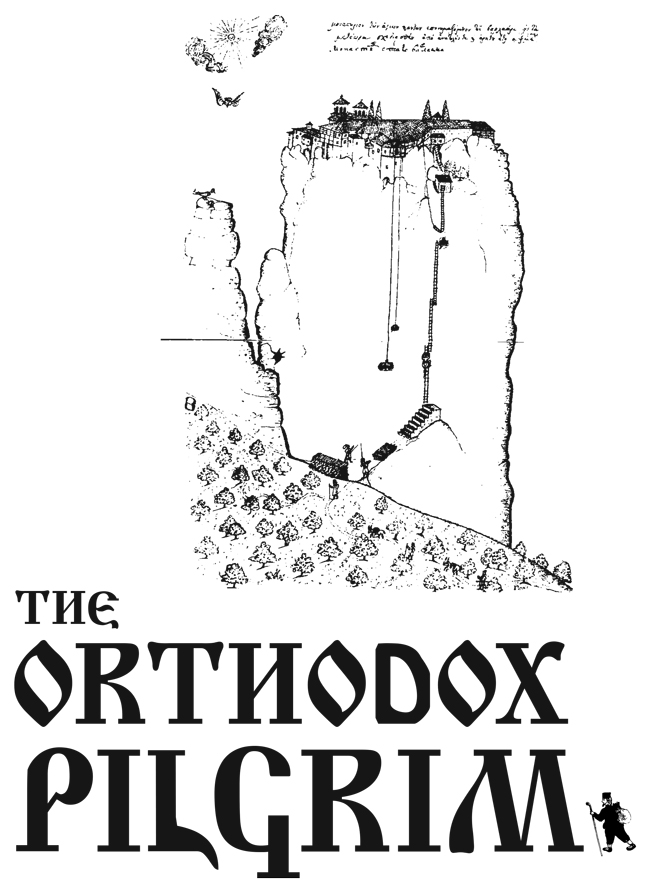
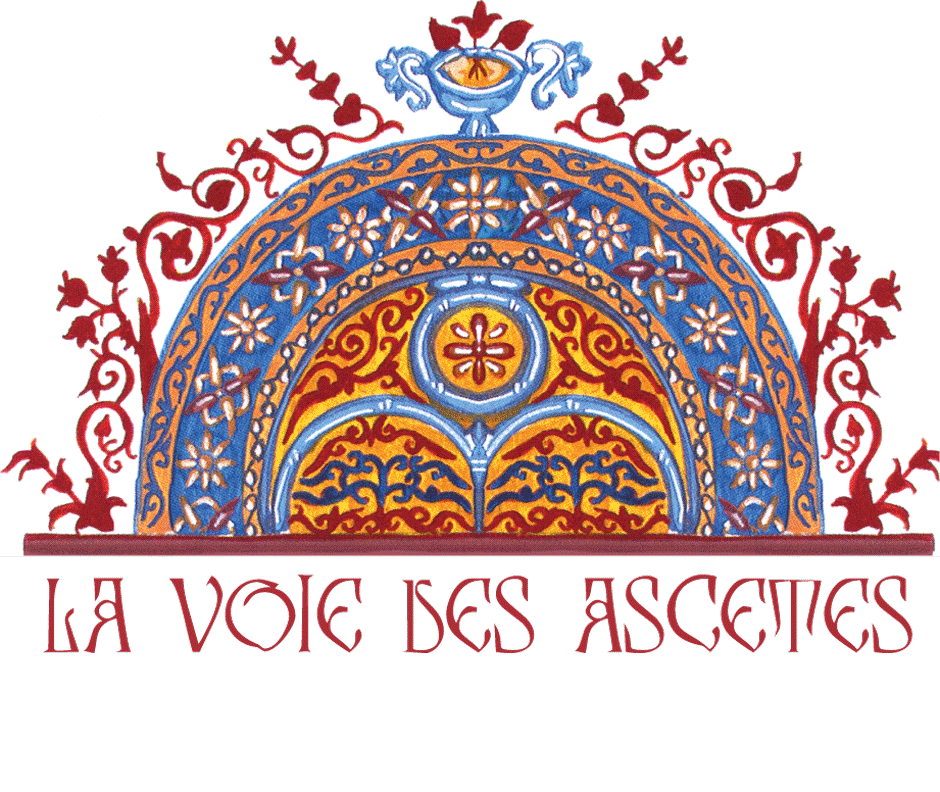
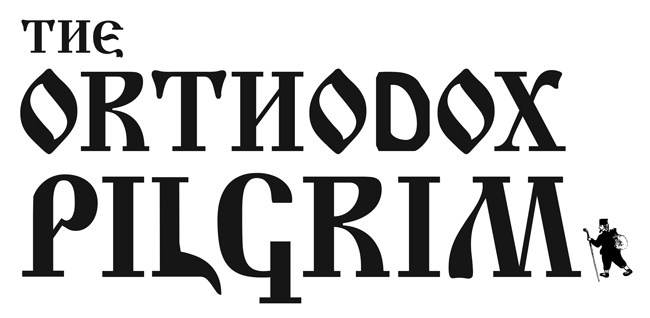
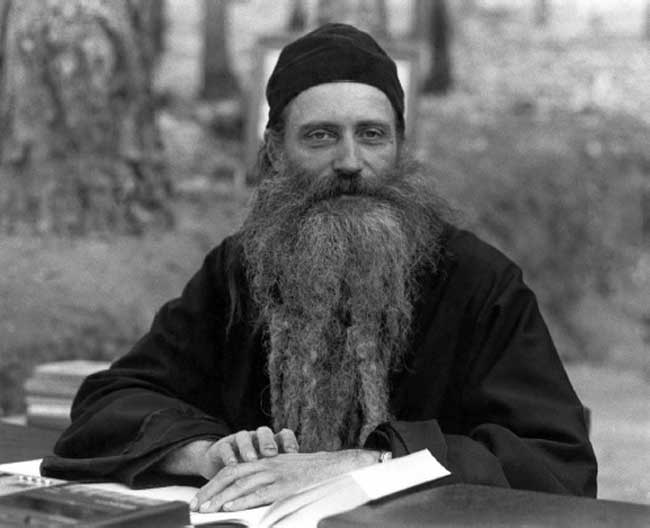
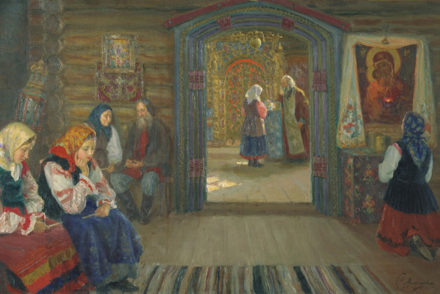
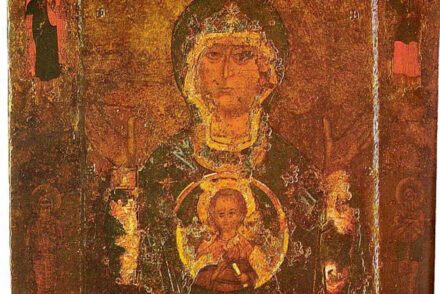
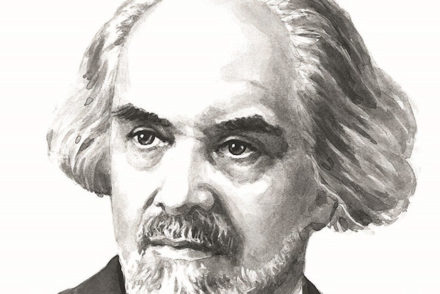
Pas de commentaire